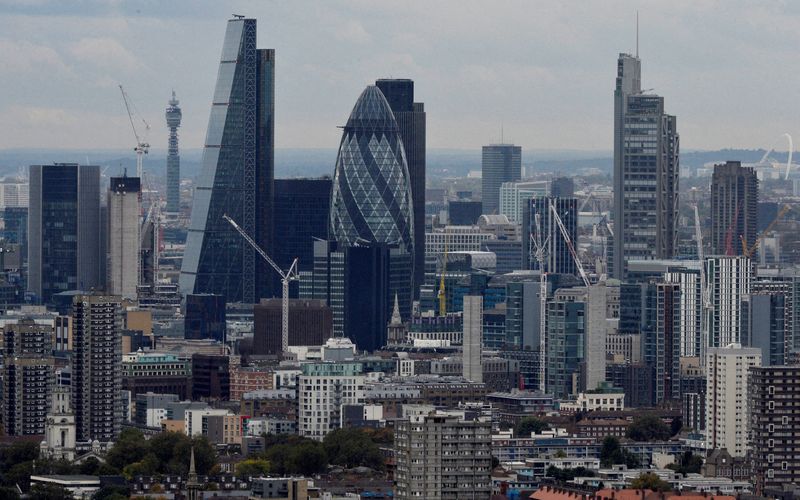UK economy ‘running on empty’ as recession signals mount – PMI
2022.06.23 12:01

FILE PHOTO: A general view is seen of the London skyline from Canary Wharf in London, Britain, October 19, 2016. REUTERS/Hannah McKay
LONDON (Reuters) – Britain’s economy is showing signs of stalling as high inflation hits new orders and businesses report levels of concern that normally signal a recession, a closely watched industry survey showed on Thursday.
S&P Global (NYSE:SPGI)’s Purchasing Managers’ Index (PMI), covering services and manufacturing firms, also showed companies raising pay and passing higher costs on to clients, a worry for the Bank of England.
The PMI’s preliminary composite index held at 53.1 in June, above the median forecast of 52.6 in a Reuters poll of economists and unchanged from May.
But the PMI’s measure of new orders effectively stagnated as it fell to 50.8, the lowest in over a year. Factory orders dipped below the 50.0 growth threshold to 49.6.
“The economy is starting to look like it is running on empty,” Chris Williamson, chief business economist at S&P Global Market Intelligence, said.
“Business confidence has now slumped to a level which has in the past typically signalled an imminent recession,” he said, adding that the economy was likely to show a fall in output in the second quarter that could deepen in the third quarter.
Growth was being propped up by previously placed orders. Manufacturers had reported especially weak demand for exports, and service firms were seeing their post-lockdown bounce reverse as the cost of living rose, Williamson said.
The PMI’s business expectations index fell by 4.6 points in June, the largest monthly decline since the start of the COVID-19 pandemic, with manufacturers and service providers both reporting their lowest business optimism levels since May 2020.
Job creation was the strongest in three months, in the latest sign of the strength in the labour market.
But employers reported difficulty finding staff and pay levels rose. That helped keep increases in prices charged by firms near two-decade highs.
Companies across the board felt the need to pass on higher energy, fuel and wage costs to customers, S&P Global said.
The Bank of England is watching for signs that the recent jump in inflation, which hit a 40-year high of 9.1% in May, might turn into a permanent problem for the British economy.
The BoE said last week it was ready to act “forcefully” if it saw signs of persistent inflation pressures, suggesting it might raise interest rates by more than its standard quarter-point increase despite fears of a recession.








